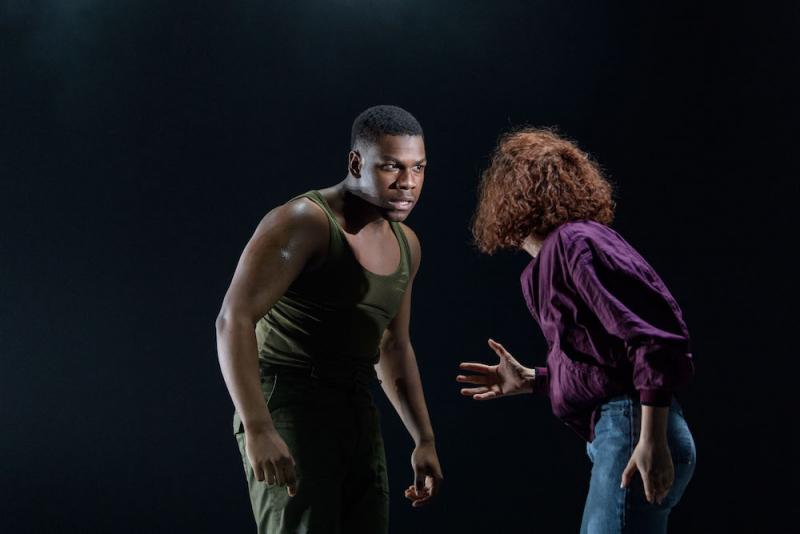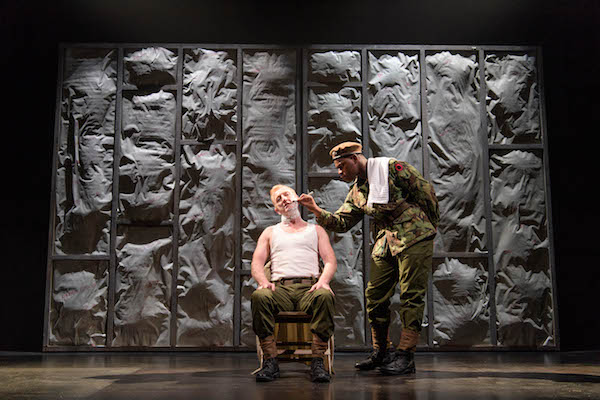Woyzeck, Old Vic review - John Boyega’s thrillingly powerful triumph | reviews, news & interviews
Woyzeck, Old Vic review - John Boyega’s thrillingly powerful triumph
Woyzeck, Old Vic review - John Boyega’s thrillingly powerful triumph
Finn from 'Star Wars' dominates a radical rewrite of Georg Büchner classic

Welcome back, John Boyega. Less than a decade ago, he was an unknown budding British stage actor, then he took off as a global film star thanks to his role as Finn in Star Wars: The Force Awakens after his debut in Attack the Block, the comedy sci-fi flick.
It’s a radical rewrite. Gone is a lot of the mystery and the poetry of the original. In their place is a contemporary, accessible version which emphasises realistic psychology (a lot of backstory detail) and social realism. The rewrite is justified by Büchner’s text, which is famously incomplete and fragmentary. Thorne includes some heightened passages from the original, which stick out a bit like bruised thumbs from the pervading ordinariness of the surrounding text. The result is an uneasy coexistence of elements, which might (at a pinch) be seen as mirroring the central conceit of the play, which is set around a British military base in Berlin in May 1981.
Joe Murphy’s production is coherent and extremely powerful
Stuck in a Cold War stalemate, Frank Woyzeck is a British soldier who lives with his common-law wife, Marie, above a halal abattoir in this divided city. Having disgraced himself while on active service in Northern Ireland, he has few friends and is not helped by the fact that the love of his life is an Irish Catholic. Talk about sleeping with the enemy. With a newborn baby, the couple are poor but initially happy. Frank has one mate, Andrews, whose sexual exploits provide some much-needed humour in what can be a depressing tale.
Despite the boredom of their routine (Frank and Andrews do a lot of guard duty), Woyzeck is not completely unpopular. His commanding officer, Captain Thompson, favours him, and, to raise money, he manages to persuade a German doctor, Martens, to let him participate in a drugs trial. But a combination of factors – the psychoactive drugs, his abusive foster-mother, worries about his child, his need to be loved by Marie, Andrews’ raging affair with Maggie, the Captain’s wife – gradually push Frank to the edge of a breakdown. If the text of the play is sometimes over-explicit, Joe Murphy’s production is coherent and extremely powerful. Tom Scutt’s brooding design uses huge industrial-type screens that trap the characters into darkened constrained spaces, while nightmarish imagery, from bright red exposed entrails to a redcoat evocation of the British Empire, illustrate Woyzeck’s descent into a mental hell. Boyega displays a great deal of muscular versatility in his journey from naïve low self-esteem, aware of his character’s shortcomings, through a dangerous anger to his final collapse. His physique is impressive; his expressivity covers the bases. He dominates the stage, using some pumped-up gestures (frequently slapping his own head), and the play is very much seen through his eyes. At the end, he achieves an Othello-like dignity in suffering.
If the text of the play is sometimes over-explicit, Joe Murphy’s production is coherent and extremely powerful. Tom Scutt’s brooding design uses huge industrial-type screens that trap the characters into darkened constrained spaces, while nightmarish imagery, from bright red exposed entrails to a redcoat evocation of the British Empire, illustrate Woyzeck’s descent into a mental hell. Boyega displays a great deal of muscular versatility in his journey from naïve low self-esteem, aware of his character’s shortcomings, through a dangerous anger to his final collapse. His physique is impressive; his expressivity covers the bases. He dominates the stage, using some pumped-up gestures (frequently slapping his own head), and the play is very much seen through his eyes. At the end, he achieves an Othello-like dignity in suffering.
At times all of the acting feels like it’s on steroids, and a sense of hyperactivity energises the whole cast. As Marie, Sarah Greene gets a lot out of a much-expanded role and convincingly shows a woman driven into a corner, while the crowd-pleasing sex scenes between Ben Batt and Nancy Carroll (Andrews and Maggie) are proudly, almost excessively vulgar. Steffan Rhodri (pictured above with Boyega) and Darrell D’Silva steer the Captain and the Doctor away from cartoonish exaggeration and towards a fractured humanity. As a picture of working-class men, this Woyzeck is powerful and effective; what gets lost is some of the poetry and subtlety of the original.
rating
Explore topics
Share this article
The future of Arts Journalism
You can stop theartsdesk.com closing!
We urgently need financing to survive. Our fundraising drive has thus far raised £49,000 but we need to reach £100,000 or we will be forced to close. Please contribute here: https://gofund.me/c3f6033d
And if you can forward this information to anyone who might assist, we’d be grateful.

Subscribe to theartsdesk.com
Thank you for continuing to read our work on theartsdesk.com. For unlimited access to every article in its entirety, including our archive of more than 15,000 pieces, we're asking for £5 per month or £40 per year. We feel it's a very good deal, and hope you do too.
To take a subscription now simply click here.
And if you're looking for that extra gift for a friend or family member, why not treat them to a theartsdesk.com gift subscription?
more Theatre
 The Weir, Harold Pinter Theatre review - evasive fantasy, bleak truth and possible community
Three outstanding performances in Conor McPherson’s atmospheric five-hander
The Weir, Harold Pinter Theatre review - evasive fantasy, bleak truth and possible community
Three outstanding performances in Conor McPherson’s atmospheric five-hander
 Dracula, Lyric Hammersmith review - hit-and-miss recasting of the familiar story as feminist diatribe
Morgan Lloyd Malcolm's version puts Mina Harkness centre-stage
Dracula, Lyric Hammersmith review - hit-and-miss recasting of the familiar story as feminist diatribe
Morgan Lloyd Malcolm's version puts Mina Harkness centre-stage
 The Code, Southwark Playhouse Elephant review - superbly cast, resonant play about the price of fame in Hollywood
Tracie Bennett is outstanding as a ribald, riotous Tallulah Bankhead
The Code, Southwark Playhouse Elephant review - superbly cast, resonant play about the price of fame in Hollywood
Tracie Bennett is outstanding as a ribald, riotous Tallulah Bankhead
 Reunion, Kiln Theatre review - a stormy night in every sense
Beautifully acted, but desperately grim drama
Reunion, Kiln Theatre review - a stormy night in every sense
Beautifully acted, but desperately grim drama
 The Lady from the Sea, Bridge Theatre review - flashes of brilliance
Simon Stone refashions Ibsen in his own high-octane image
The Lady from the Sea, Bridge Theatre review - flashes of brilliance
Simon Stone refashions Ibsen in his own high-octane image
 Romans: A Novel, Almeida Theatre review - a uniquely extraordinary work
Alice Birch’s wildly epic family drama is both mind-blowing and exasperating
Romans: A Novel, Almeida Theatre review - a uniquely extraordinary work
Alice Birch’s wildly epic family drama is both mind-blowing and exasperating
 The Producers, Garrick Theatre review - Ve haf vays of making you laugh
You probably know what's coming, but it's such great fun!
The Producers, Garrick Theatre review - Ve haf vays of making you laugh
You probably know what's coming, but it's such great fun!
 Not Your Superwoman, Bush Theatre review - powerful tribute to the plight and perseverance of Black women
Golda Rosheuvel and Letitia Wright excel in a super new play
Not Your Superwoman, Bush Theatre review - powerful tribute to the plight and perseverance of Black women
Golda Rosheuvel and Letitia Wright excel in a super new play
 Cow | Deer, Royal Court review - paradox-rich account of non-human life
Experimental work about nature led by Katie Mitchell is both extraordinary and banal
Cow | Deer, Royal Court review - paradox-rich account of non-human life
Experimental work about nature led by Katie Mitchell is both extraordinary and banal
 Deaf Republic, Royal Court review - beautiful images, shame about the words
Staging of Ukrainian-American Ilya Kaminsky’s anti-war poems is too meta-theatrical
Deaf Republic, Royal Court review - beautiful images, shame about the words
Staging of Ukrainian-American Ilya Kaminsky’s anti-war poems is too meta-theatrical
 Laura Benanti: Nobody Cares, Underbelly Boulevard Soho review - Tony winner makes charming, cheeky London debut
Broadway's acclaimed Cinderella, Louise, and Amalia reaches Soho for a welcome one-night stand
Laura Benanti: Nobody Cares, Underbelly Boulevard Soho review - Tony winner makes charming, cheeky London debut
Broadway's acclaimed Cinderella, Louise, and Amalia reaches Soho for a welcome one-night stand
 The Pitchfork Disney, King's Head Theatre review - blazing with dark energy
Thrilling revival of Philip Ridley’s cult classic confirms its legendary status
The Pitchfork Disney, King's Head Theatre review - blazing with dark energy
Thrilling revival of Philip Ridley’s cult classic confirms its legendary status

Add comment